2543-9839


2543-9839

am giving you the next quarterly of The Warsaw Institute Review in this year. The theme of the last issue was definitely dominated by energy and global geoplitics. This magazine will be different – special editon.
Public opinion is primarily focused on Russian aggression in Ukraine and its impact on international relations. However, at a time when hard power takes over, we must not forget about the power of soft power and diplomacy.
In order to analyze the issue of public diplomacy and its role in the changing international security environment, it is important to get to know the strictly diplomatic point of view, i.e. diplomats and especially ambassadors from different parts of the world
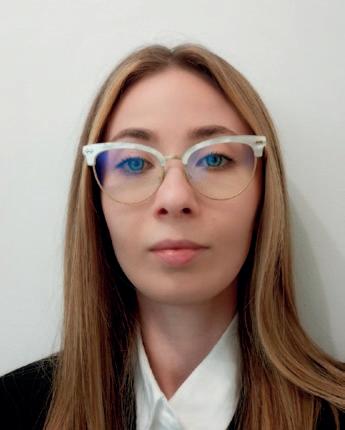
The newest issue delve into the compelling theme of "Public Diplomacy in a changing security environment," offering a captivating collection of high-level interviews with esteemed diplomats. These interviews shed light on the pressing topics of European concern, providing a unique and invaluable perspective of the work by the distinguished Embassies in Poland.
I put at your disposal extensive talks with His Excellency Mr. Ambassador of Türkiye to Poland and Her Excellency Mrs. Ambassador of Hungary to Poland. In order to learn about Polish
© Copyright 2023
The Warsaw Institute Review Warsaw, Poland
Editor-in-Chief
Patrycja Sokołowska
patrycja.sokolowska@warsawinstitute.org
Translations
Aleksandra Iskra
Aleksandra Tomaszewska
DTP and Printing www.sindruk.pl
perspectives on foreign affairs and diplomacy, I also present an interview with the Chairman of the Sejm Foreign Affairs Committee
I hope that these topics will a valuable reading for you. I wish you a pleasant reading,
Patrycja SokołowskaEditor-in-Chief
The Warsaw Institute Review
Publisher Warsaw Institute
Wilcza 9, 00-538 Warsaw, Poland
www.warsawinstitute.review www.warsawinstitute.org
The opinions given and the positions held in the materials published in the Warsaw Institute Review solely reflect the views of the authors and cannot be equated with the official position of the Ministry of Foreign Affairs of the Republic of Poland and Ministry of Culture and National Heritage of the Republic of Poland.
ISSN 2543-9839
Katja-Elisabeth Herrmann, Kacper Kita
Public Diplomacy from the Turkish point of view
Interview with His Excellency Mr Cengiz Kamil Firat Ambassador of Türkiye to the Republic of Poland
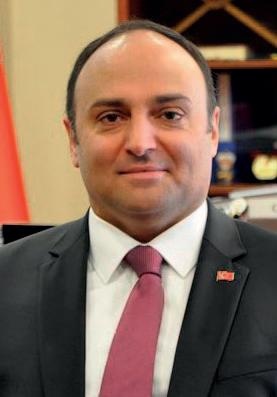
interview
Liliana Śmiech
Hungary’s Perspective on Public Diplomacy
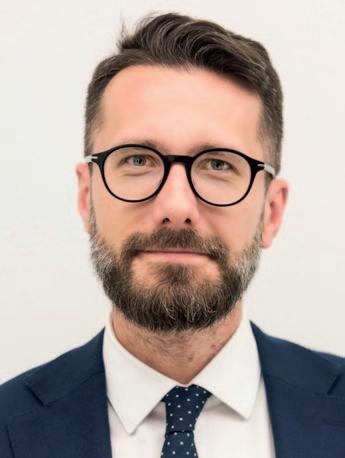
Interview with Her Excellency Mrs Orsolya Zsuzsanna Kovács Ambassador of Hungary to the Republic of Poland
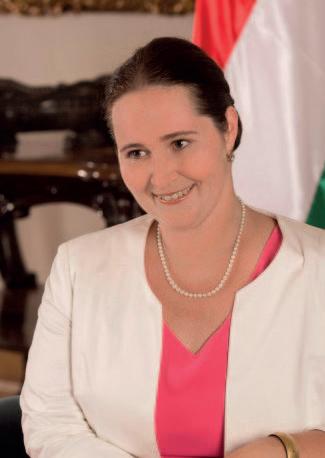
interview
Liliana Śmiech
Foreign Affairs – Polish Perspective
Interview with the Chairman of the Committee on Foreign Affairs (Sejm) Mr Radosław Fogiel
AmbA ss A dor of t ürkiye to the r epublic of p ol A nd, m r
c engiz kA mil f ir At
Mr Cengiz Kamil Firat is a political scientist by education (University of Buckingham, College of Europe in Bruges), he held m.in position: attaché at the Permanent Representation of Turkey to the EU, secretary at the Turkish embassy in Algiers, secretary, adviser at the Permanent Representation of Turkey to the OECD, Ambassador of Turkey to Kyrgyzstan. He has officially held the position of the Ambassador of Turkey in Poland since May 19, 2021 (the date of submitting his credentials to the President of the Republic of Poland).
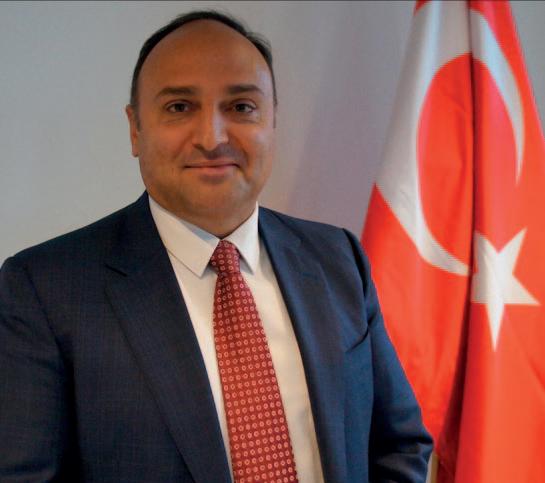
Question 1- h ow h Ave t urkishp olish rel Ations evolved
A nd strengthened in the l A st few ye A rs? w here do you see the most importA nt common interests A nd fields of interest between the two countries?
[Mr Ambassador, during your tenure as Ambassador in Poland, public diplomacy, and Polish-Turkish relations have become even closer together much more than they were before. So what have you noticed about yourself as an ambassador at this very critical time, for both countries?]
Answer from the AmbA ss A dor
Thank you for the question. What’s interesting in this critical time is that there have been a couple of
developments. One is related to what you were saying: Poland has started to flex, its muscles, so it’s a country that, I think if I’m not mistaken, is the 21st in the world in terms of GDP and is pushing to enter the G20 countries and it’s one of the while the main players, if not one, is the main player within the north-south line that goes all the way from the Baltic to Bulgaria. So Via Capatia, all the Three Seas Initiative. So when you look at that, it’s a NATO member country but at the same time, it’s an EU member country. So overall it’s a country that is developing very fast. I would even say that it has developed to a level where it is caught up with the rest of Europe, European Union, not only Europe, but European Union, but now, of course, it has to amass the critical amount of capital that is needed to become a
strong, viable country. It’s still building its simple structure, whether beads on top of the ground or whether in terms of people power as well. But it’s a country that is doing very well since the beginning of its membership with the European Union. It’s done amazingly well in terms of incorporating the amount of aid that has come in from the European Union and soon it would become a net contributor, if I’m not mistaken.
When I came here was a country that was ready to play in international politics. It was already playing this role with the Eastern Partnership. It was one of the two countries that were instrumental in pushing for an eastern partnership. It’s doing the same now within NATO, with the eastern enlargement issues and also the eastern Flank. So it says: look, we are here, we’re members of the European Union, we’re members of NATO, the Council of Europe, etc., but at the end
of the day we are a peripheral country, so I need to develop fast. I need to be strong and this is where it started, looking to other countries from Europe, from the Transatlantic partnership as well. And I think they made such strategic choices.
South Korea, and also Türkiye, for that matter. This is what I was taught when I came here: Türkiye was one of the countries with which Poland saw too many issues, and we had no quarrels, we had no problems whatsoever, even dating back to history.
There is much more cooperation from the time when we had to fight with each other. So when you look at where we stand, we are both at the periphery of NATO, towards the east. We are both at the periphery of the European landmass towards the east and when you think about where everything is going towards the East at the moment, whether be it with Russia, whether be it with China,
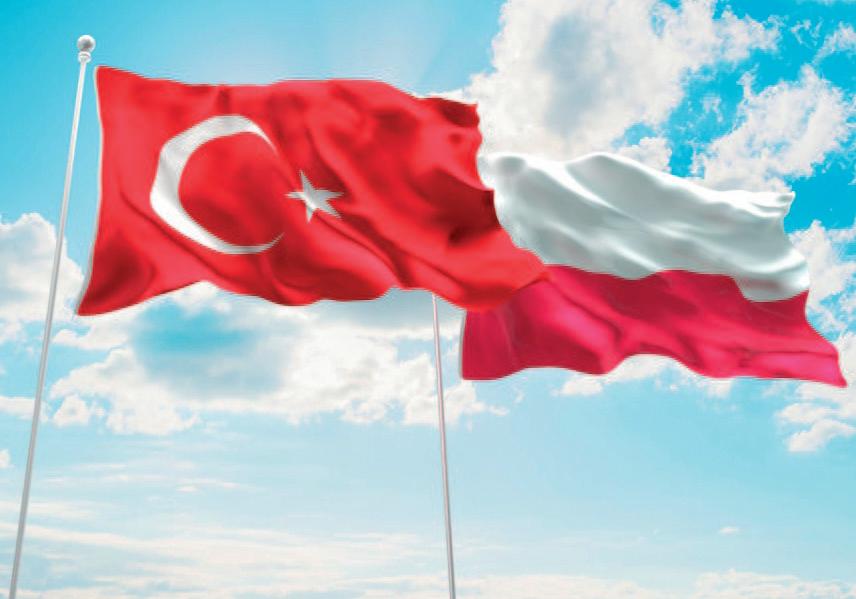
NATO has an issue at the moment. So Poland is right on the front lines. So is Türkiye. So I came within that context.
Now, when you look at what happened in Ukraine, we see it. We have differences in approach: Poland has a different role to play. It’s playing a very omnipresent role vis-a-vis helping Ukraine. It’s logistic, humanitarian help, it’s military help, etcetera, and it’s been involved very heavily in terms of military equipment, training, etcetera. But so have we. Without actually advertising it as much as some others, we are playing a very present role as well, a very important role in Ukraine. So with all that, in the context of the work that we’re doing together, we came together (Poland and Türkiye).
I concentrated on economic affairs. When I came, one of my goals was to increase bilateral trade above 10 billion dollars. Now we have over 11 billion dollars worth of bilateral trade. Trade is increasing. We tried to advertise as much as possible the possibilities that exist in Poland because Poland is a natural logistic. If you come and set up shop as a Turkish company in Poland you can work with the rest of the European Union, you can work with the Baltic, you can work with the centraleastern European countries, you can work with Ukraine, you can even work with Russia (pre-war). So it was a perfect place to set up shop, it is cheaper to do work here, to get the workforce and very good logistic connections for Turkish companies.
One of the things that we spoke about was We [Poland and Türkiye] both understand that in this geography you have to be strong, you have to be strong economically, you have to be strong in
terms of production and you have to be strong in terms of military power as well, and you have to have a stable government, a government that continues. That’s what we saw, for example, in the elections - in Türkiye as well. People opted to continue its stability rather than an unknown factor of six or seven different parties getting together and creating an opposition. So now for us, what was very important was that we saw an emboldened counterpart that was willing to go forward with us the way we thought we would be able to go forward with Poland. So it came about and in political terms, we have no problems whatsoever: Poland supports Türkiye’s membership to the European Union; It supports us in terms of our candidature in different international organizations. But we do the same for Poland as well.
And of course, we also concentrated on tourism. When I came here, we were number three in terms of the number of tourists that go abroad from Poland, number one was Croatia, number two was Greece; number three was Türkiye. Last year we had 1.2 million tourists from Poland visiting Türkiye and we became number one and this year we will stay as number one. Then we will increase our share. We will go up to a million and a half. That was one of the reasons why we did something - for instance;
- We introduced a system where Polish people do not need to have their passports with them. Because poles go on holiday with their families. But when they’re going with their families they have to get passports for their kids and it takes some time in the process to go and get passports, et cetera. So instead of going through all that, they
preferred to go to countries where there was no passport, and they could only go with their IDs. We’ve got the Ministry of Culture and the Interior Ministry to agree, and now we apply the same. So more and more Poles are coming to Türkiye for their holidays. So number one, and hopefully, we’ll stay there, hopefully, we’ll stay there.
- In terms of military cooperation, we are both members of NATO so we use to procure and produce the same military equipment. So, we have come up to a level where we produce 80% of our needs (Türkiye) so we are more advanced vis-a-vis a lot of the other NATO countries – we are in the top 3 or 4 in terms of production. There is a lot of equipment which Poland was interested in. So, we cooperated in this field where I tried to put Türkiye weight on the table [not going into the details] but it is getting to be a very fruitful relationship. Not only buying and selling but also collaborating. More forces are coming to Polandbilaterally, for routine exercises and also within the context of NATO. So, all of this is happening and it is increasing. We just had the head of the Air Force here on a visit a couple of days ago. So, it is going well in all directions. Politically, on a bilateral level, cooperation is strong - no problems whatsoever. Economically, it is also going well, increasing. So, I am happy being here, and happy to have made a catalyst role in the development of things- I was able to pinpoint the right issues and go after them as much as I could.
- We also tried to do a lot of public diplomacy. We tried to do a lot of cultural work - as much as we could. We also tried to do different types of
events (as much as we could). This year, it is the 100th year anniversary of Poland and Türkiye. Unfortunately, our budget has been cut largely due to the loss of life in the earthquake in Türkiye. Most of the resources and the budget are going to the earthquake zone. At the moment, the budget is concentrated on six or seven projects we want to finalize before the end of the year. But it is going well as well. This is a summary of answering your question.
- The topic of education was also very important for us. The number one destination for Turkish students in the EU, in terms of Erasmus+, is Poland for three reasons.
1) Polish universities have high regard because they also give lessons in English.
2) It is a safe and well-established country in terms of getting an education.
3) Poland is not in the eurozone so paying in Zlotys is relatively better for a Turkish student to sustain themselves and get a quality life while studying here at competitive prices.
So, all of these combined make Poland a preferred destination. Turkish students continue choosing Poland as their number one destination. Not only Erasmus+, but we are also getting a lot of students that are actually choosing Poland for their normal, even PhDs, master’s degrees or undergraduate. So there’s a lot of, I think one of a thousand Turkish students in undergraduate at the moment who are paying themselves and studying here. So quite a lot of interest and there’s a lot of interest from Turkish
companies, more and more people are coming here, working as expats. And one thing which is also very good is that Poland is doing this system where instead of accepting the workforce, the labor force directly saying, oh, we need 1000 people here, 10,000 people there, et cetera - because demographics are going down in Poland - they’re accepting more and more people in universities. And then from the universities, they are accepting those they see that have been okay during their studies, no problem whatsoever. Straight away, they want them to continue and live in society, work in society and contribute to society, which is a perfect way to go forward with accepting foreign workforce. And I think a lot of Turkish students are using this as well. A lot of them are staying here. And I think it’s a win-win situation for both countries because when you look at the demographics of Poland, it doesn’t look too great. This is one of the biggest problems that Poland will face in the years ahead. So they will need an educated workforce which and the universities are the best gateways to get this educated workforce.
It’s quite a fantastic and robust overview, you explained on most of our points. So, we will try to focus the conversation more now on the specific points. You mentioned several points related to Poland’s GDP, the G20, the Three Seas Initiative - for which the Institute dedicates a substantial amount of work to, and about the elections (both in Poland and in Türkiye).
Question 2 - h ow cA n t urkish interests in c entr A l A nd eA stern e urope be defined in the context of building A network of influence A nd cooper Ation? w h At future do you see for form Ats such A s
the t rilogue between t ürkiye, p ol A nd, A nd r om A ni A?
Allow me to begin the question with the Three Seas Initiative. Now, we have observed the development, and this is an initiative that has been running for quite some time but has just materialized in the last, three or four years, actually coming into place. So, how do you see the Turkish role in the Initiative? I mean, Türkiye is officially not part of it, but still, given the partnership of Türkiye with Poland, as you mentioned, is quite strong and will continue to strengthen. How do you see this future prospect? Do you see Turkish investment increasing and supporting the cause? Or do you see Türkiye even as a possible active member?
Answer from the AmbA ss A dor Well, let me link this with a greater evaluation, strategic geographic evaluation in general. Türkiye’s relationship with the European Union and its position within the European landmass is very important. Now, we are going through a time where it’s rough because of the war that is ongoing in Ukraine. But that has also taught us and shown us that none of us were prepared for things to come. None of us. I think Poland was probably the most prepared out of all because Poland has been saying look, this is what’s going to happen, they’ve been preparing better than most, etc. and it turned out to be true. We, on the other hand, we’ve been having our own regional problems, etc. So we are in a different ballgame vis-a-vis the Russians. We’ve been dealing with them for quite some time. But we also have a very fruitful relationship with the Russians. We have a very positive relationship in terms of energy, for example, because they supply a lot of energy that we get, etc. etc.
Now, when you look at the geography in Europe, we find that going forward, you
need to have a strategic outlook on where Europe is going. You need to find out whether Europe is going to remain as a fortress for the European Union or are we talking about Europe in general? If we’re talking about Europe in general, then you have to think about the MENA region as well. You have to think about North Africa as an adjacent area. You have to think about the Mediterranean. It will directly impact the European Union, whether it’s liked here or not. You have to think about Russia. You have to think about Türkiye. These are countries and these are regions that are directly linked, and much more so than people imagine, to the European Union. You have to have a new European security architecture. This has to come to the fore.
The European security architecture that existed after the Second World War is no longer applicable. The OSCE doesn’t work as it should, the European Union doesn’t have the structures at the moment to deal with the realities on the ground. NATO is a different player with the US taking the lead and of course, people are saying okay Russia has to be brought down to its knees.
Russia made the mistake of attacking Ukraine because it thought that it could continue in the cycle of things that it did in the Balkans, in the Caucasus, with Georgia, etc. But people, you know, all the countries said enough is enough. And after 2014, enough was enough. Now they’re coming to terms with enough is enough. So, going forward, will Russia be brought to its knees? We don’t think so, not from Türkiye’s point of view. Has Russia not gained anything in terms of its power? Yes, it hasn’t. On the contrary, it’s shown that it has a lot of weaknesses. But it’s not a country that can be undermined or under-evaluated. That would be the biggest mistake that
anybody in Europe or in the West can make. It would be wrong. So Russia and Europe were the question about 10-15 years ago. Now, Russia with Europe is what we should think about. A new European security infrastructure and security structure should be discussed, where everybody could understand that there are certain things you can do, and there are certain things you can’t do. And there are certain things that you ought to do for everybody, not just only for Russia, but for everybody. And we should strive to go forward with this. This applies to us as well.
So, when Poland along with Romania is thinking about building this northsouth, where do you come to? You come all the way to Bulgaria. Why? Why do you stop in Bulgaria? Where is your trade going to continue? The biggest partner in the Black Sea, whether looking at it from the road or whether you look at it from the sea, is Türkiye. If you’re going to continue, if the world is going to continue to live and evolve, trade is going to come from China, whether you like it or not. It’s going to come from India, whether you like it or not. Your demographics in Central and Eastern Europe are going down, whether you like it or not. Türkiye, India, China, Iran, Asia, this belt - is where the growth is at. And you have to think strategically. And you have to think about five years down the line. I’m not talking about 50 years down the line. But right now the strategic thought doesn’t exist in Europe. I don’t see anybody thinking about the strategy in Europe at the moment. We saw that not much strategic depth was there in Ukraine. Vis-a-vis Türkiye it’s definitely not there.
If you think about Türkiye only as a country, - oh it’s a Muslim country that is there about human rights - no, you’re thinking very shallow, very very shallow.
And the world doesn’t revolve around every country. The world is, you should think of it as a global village, developing very fast. Mexico has a role to play. Brazil has a role to play. Argentina will have a role to play. Türkiye, Iran, and even Kazakhstan will have a role to play. Uzbekistan will have a role to play in the future. And these will be much bigger than you think. If we think that we’re going to have, we’re going to beat the West, we’re going to beat Russia today, and then we’re going to continue and beat China tomorrow, you’re mistaken. These countries are not countries that will be beaten in one battle or one war. They will come back. It’s as simple as that. Look, you’ve been putting the Iranians on sanctions for how many years now? 40, 50 years, maybe plus? It hasn’t done much right?
So, you have to think about these things in a much better way. The European social welfare system, wealth, democracy, human rights, all well. But what happens to human rights when Macron is saying we’re going to limit the use of the web or social media? So you were preaching to me two days ago that you’re not doing something proper and now look at what you’re doing just because the same is happening in your country. So what happened to all the preaching? So you have to think a little bit more globally. Your values that you have within the European Union doesn’t correspond to the values of the guy who lives in the Caspian.
The values of the Caspian don’t correspond to the values of the guy who lives in Hiroshima. And we have to move to this level. We’re not there. We’re not there. We’re thinking very regional, very small. And the thing about the Three Seas Initiative also, it’s a very good idea, but the idea is very limited. Why? Because it’s thinking about, look, we’re
in NATO, we’re in the European Union, and we are thinking about the fact that in the West, you look at the map, you see the electricity grid, you see the transportation grid, you see all of the links, the networks, are in the West. And they’re going from West to East, because that’s how traditionally the European Union has developed. Whereas here, we became members in 2004, we became members in 2004, and we are, when you look at from North to South, in the Central and Eastern European countries, we don’t have the same level of development, so we will be a driving force of developing this. Fine, but where do you stop? Why do you stop there? So, why are you saying Turkish investments should be within the Three Seas? Why shouldn’t the Three Seas countries invest in Turkey and build further? See, that’s what I’m saying. It’s always one-sided when it’s the talk coming from the European Union or from the transatlantic.
You do have very compelling points offering a sound and a a valid perspective for sure. In this regard, the triad between Poland, Türkiye and Romania, how do you see this moving forward? I completely understand that it’s indeed that these two countries need to invest in Türkiye as well. How do you see this going forward?
I think it should be both ways. The investment is coming from Türkiye. Look, right now, Türkiye is the biggest investor in Romania. It’s probably one of the biggest investors in Bulgaria. There are more than 1.5 million Turkish tourists that go to Greece. It’s one of the biggest players in the Greek tourism sector. We’re doing a lot of investments
in terms of coming here. But the same has to happen the other way around, because we need to work, live together and develop together at the end of the day.
Whether you like a certain politician or a political thought shouldn’t be strategically, this is second nature. Countries, states, people shouldn’t be hostage to a single person’s thoughts, whether it be in the European Union, whether it be somewhere else, everybody should come to an understanding that we should think strategically ahead. That strategic thought at the moment is lacking in Europe. That is for sure.
The US, as far as I’m concerned, the US is the dominant power in the world and it sees things from only the perspective of what I want and this is what I will do to attain what I want. Anything else in between that policy is just in its way. There’s no – let’s talk about it, let’s discuss, let’s, you know, – look, they decided they were going to Iraq, they came out of Iraq. They decided they will go to Afghanistan, they came out of Afghanistan. Nobody had an idea. They were going to Ukraine, full force, Trump came into power, he came out. So what happens to everybody’s strategic thinking and policy? What is Poland going to do by itself when the Americans come out? This is the reality of strategic thinking. This is where we ought to come together. For example, with Poland, with Romania, with Ukraine.
I advocate for example the fact that Türkiye, Poland and Ukraine also have a lot in common. A lot in common. Big sized economies, big populations that can come together, work together and we are in the periphery. And we are, we understand the East and we understand the West. Same with Romania. I can’t say the same with the Baltic countries
because they’re very small. But with Poland, with Ukraine, with Romania, think strategic, think big. These are big countries, big economies, big know-how, big education, big industry. It can go forward, and this is what I advocate for example, what I advocated while I was here and what I will advocate when I go forward as well.
This doesn’t mean that I will not work with Russia. On the contrary, I will also work with Russia but I will not make Russia my adversary. If it’s, for example, I don’t accept what Russia has done in Ukraine and I tell it so. In Crimea we have Turks, they’re called Crimean Tatars. They’re my kinsmen and I don’t like how they’re being treated, as much as I don’t like how the Ukrainians are being treated and I want territorial integrity for Ukraine but it doesn’t mean I want to bring Russia to its knees. There I stop. I have to work with Russia and I know I will live with Russia for the foreseeable future. Well done. Russia had the policy of wanting to come to the warm waters as we call it, the Mediterranean, for hundreds of years. We fought with the Russians for hundreds of years. We had 12, 13, 14 wars with them, more than probably anybody else, including the Poles. But they handed Syria on a plate and now they handed bases in the Mediterranean on a plate to the Russians. And now we have to live with that. They’re in the Caucasus, they’re in Syria, they have a base just a couple of kilometers away from the Turkish coast. They’re in the Black Sea. So I’m encircled. But I have to live with this. I agree that I have to live with this. Europe, NATO has to agree, understand that they also have a right to live, and the Russians have to learn and understand that they cannot do things the way they’ve been doing.
So, we have to come to a new European security architecture, we have to deal
with it. Maybe the big guys are discussing this, all of us we don’t know how they’re discussing it or what is happening. You get reports these days that Lavrov was in New York, etc, etc. We don’t know what’s happening in the background. But the thing is, we have to calm down, we have to sit down, because we’re going to a level where we will probably not enjoy if this continues as is. And if we have an accident, a nuclear accident, in the nuclear power plants in Zaporizhzhya, or if we have a tactical nuclear bomb going off, etc., none of us will enjoy our lives. If China happens, or more generally, if there is a war between the Western powers or the other countries such as Japan, India, Korea, Philippines, Australia, etc. with China, what we have seen in terms of economic downturn in the world will be nothing in comparison to what will happen with China. The whole world will go down the drain in terms of economics.
Mr Ambassador, you mentioned strategy a lot. And I think that this is also something that has been widely discussed in Türkiye
in recent years. And perhaps this is also something that we can perhaps clearly learn from you. etc. There’s been a lot of tightness in Turkish foreign policy, foreign strategy. And there’s also been a lot of talk about the next Turkish century, because this year - there’s the 100th anniversary of the founding of the Turkish Republic, and we obviously know that Türkiye itself is much, much older than 100 years. As you also mentioned, President Erdogan has won another term and at the same time we have continuity and stability as you mentioned, which is very important for a country to be able to project power and project strategy in the long term. But at the same time there’s been some changes. There’s a new foreign minister and when you look at the 21 years that President Erdogan has been in power, in different phases, phases more concentrated on the economy, more concentrated on internal politics, more concentrated on foreign policy, education, military, etc. How do you see the next five years? How do you see the priorities of Türkiye in the next couple of years and how do you see the next Turkish century? What does this mean
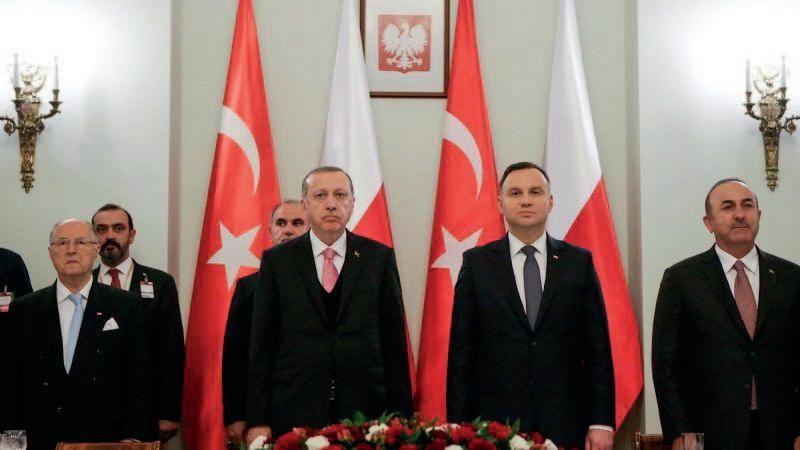
strategically in the sense of building up Turkish power?
Question 3
p resident r ecep tAyyip e rdog A n h A s just been reelected for A nother term.
t his ye A r is A lso the 100th A nnivers A ry of the founding of the r epublic of t ürkiye A nd p resident e rdog A n mentioned m A ny times the ide A of A new t urkish century. w h At do you think A re the biggest ch A llenges, priorities A nd goA ls for t ürkiye both in the next 5 ye A rs of m r. e rdog A n’s term A s in the coming century?
Answer from the Amb A ss A dor
These are very political words. These are grand projects, you know when you’re talking when you’re going into elections, you talk about these grand awards and you bring it out to the attention of the public. What I don’t know about how to tell you what are the main frames of this Turkish century, but what the president wants to do is that he said we have come to a level where we have to go to another level. Because we’re at this, you know, around 10,000 per capita income level, where you’re in the G20, but everything depends on how well you grow. And in terms of growth, there’s a couple of things.
One is that you need to grow economically. Development is very important. You need to grow from a point of view of education, academics, the whole country has to be brought up to a certain level. And three, of course, you have to be very careful about your internal security, your external security, and your basically armed forces have to be strong enough to deter any adversary. We don’t live in an easy environment
around us. There are a lot of issues. If you look at Ukraine, Crimea is closer to us in Türkiye than it is to Poland. If you look at, you know, we have Russian garrisons in Armenia. The borders of Armenia are protected by the Russians. We have issues all around us. Iran is a neighbor, Syria is a neighbor, Iraq is a neighbor. We have political problems with the Greeks, with the Greek Cypriots. So it’s an area that is very difficult for us. But it’s an area where we have to work together. We have to come to an understanding with people. And I think now you see a development towards there, where we’re coming to, we’ve just opened up an Embassy with the Egyptians, for example. We’re talking with the Saudis, we’re talking with the Emirates, with Iran. It’s a relationship that continues based on mutual respect, etc. With the Russians, the same, with the Ukrainians, the same. So we need to have a strong country where we can cater for ourselves economically, don’t depend on anybody, and definitely cater for ourselves in our own military deterrence. Because we saw that we cannot trust anybody, unfortunately. When push comes to shove, nobody is there to back you - on the contrary, they use it as leverage. So Türkiye learnt this a way back and has been developing its military industry. So, once you become self-sufficient in terms of taking care of yourself, that gives you leverage in your diplomatic world.
At the same time, we are a country where we are very much anchored to the West. We are members of the Council of Europe, we are members of OECD, we are members of OSCE, we have a customs union with the European Union, etc. etc. We are members of NATO, so we are in the transatlantic community as such. Most of our trade - nearly less than 50% now, but more than 40% of our trade is with
the European Union. So we will continue to have this very strong relationship with our EU friends, not as much at the same level with the US but it will change over time.
But what we have been doing is the fact that we are moving to a level where we see ourselves as more independent in our decision making in terms of... We don’t like being told what to do from Brussels or Paris or Berlin or Washington. As much as we don’t like being told what to do from Beijing or Moscow. That’s very important. When people look at Tokyo, they say, Oh, they’re moving away from the West. No, we’re not going anywhere. We don’t like taking any instruction, or we don’t like being told what to do from Moscow or from Beijing either, or any other capital, or any other interest group. We have our own interests. And if we see eye to eye with the European Union or with the US on a certain policy, we go forward with that. But we decide what we want to do. So we will continue on this path.
Some people, some countries don’t like it. And that is why they make it hard for us to continue on this path. Yes. But we will continue on this path. It is a choice.
Thank you, Mr. Ambassador. My next question follows on the recent developments. Now, we’ll discuss a little bit about President Volodymyr Zelenskyy’s visit to Türkiye. Well, the commencement of a new round of talks between the Greeks and the Turkish. Once again, to retake the topic of public diplomacy, which we have perfectly elaborated already. Now, I’m interested in what you just said about pursuing domestic interests. Recently, President Erdogan mentioned that Ukraine deserves to be part of NATO. How do you perceive and evaluate this agenda? And how can this idea fit within the Turkish
interests? And also established good relations - as you mentioned - with the Russians.
Generally, how do you see the future of developing peace and stability with Ukraine, Russia, and also Turkey and Poland being close to this conflict?
Question 4
p ol A nd A nd t ürkiye A re both n Ato A llies who see militA ry cA pA bilities A s their priority. lA st ye A r, f inl A nd wA s A dmitted A s A new n Ato member. h ow do you see the roA d A he A d in reg A rd to sweden’s Accession, which needs to be A pproved by t ürkiye? m ore importA ntly, in the words of president e rdog A n, u kr A ine deserves nAto m embership. h ow do you envision this m Ateri A lizing? d o you think this cA n be possible in the coming ye A r?
Answer from the Amb A ss A dor
I think we see eye to eye with Poland on this. But like I said, our approach is a bit different, but the end result is the same. We want that same end result. We want Ukraine to remain intact with its territorial integrity. We want Russia to move out of the territories it’s invaded, including Crimea. We want the hostilities to cease, to end with an agreement that can work. This is where we stand. I think what we would like for Ukraine is we believe Ukraine has the necessary development mindset to join the Euro Atlantic institutions and the trans Atlantic institutions. European Union, it’s a matter for the European Union to decide. NATO? Yes, we believe Ukraine should become a member of NATO. How and when? Takes time. Because you cannot make a member who’s fighting at the moment an actual
war, an open war, to become a member of NATO, especially when they’re fighting with the Russians at the moment. But once there is a ceasefire, once there’s an agreement, yes, they should become members of NATO, which would also guarantee us the borders of Ukraine will become the territorial limits of NATO.
Because I don’t see for the foreseeable future Belarus, unless there’s a fundamental change in Belarus. And it’s not only Lukashenko, fundamental change in Belarus mindset also. It’s not just the regime. I don’t see Belarus or Russia changing for the foreseeable future. So, Ukraine could become like Turkey. Poland will have Kaliningrad, of course, and Belarus as neighbors. But the rest will be Ukraine. Once Ukraine becomes a member of NATO.
But we would like to have a reliable, secure and stable Ukraine with which we will also have strategic relationships. So we would like to have them as a partner in NATO. We already see them as a strategic partner. We have a strategic level relationship with them as we have with the Russians. But we don’t see a problem of Ukraine joining NATO because we don’t see Ukraine as the Russians see Ukraine. The Russians have a different outlook on how they see Ukraine. We don’t. We have a different outlook on how we see Ukraine. So it’s natural. And we say it outright. And we talk to the Russians about this and we tell them we don’t agree with what they’re doing in Ukraine. We tell them what they did in Georgia is not correct, et cetera, et cetera. But at the end of the day, we believe that we should come to an agreement and the killing should stop because look on the

ground. At the end of the day, we are talking about one village here for a couple of months, one village there for a couple of months of fighting.
Then result, hundreds, thousands of young men are dead. For what? 2023They understand they will not be able to come forward anymore. That NATO countries, the Western countries were not allowed them. We also have to understand that killing thousands and thousands of Ukrainian people for one village every couple of months is not worth it. When are people going to understand that if you sent your troops and they came back in their thousands with body bags to whatever western country, you would have a huge outcry. So why are you letting the Ukrainian die like this? You’re saying the Russians don’t stop, but let’s make them stop. We have to come to an agreement on this. It’s not going anywhere. We saw this. It was built up as a big counter attack. Yeah, okay, but it’s not going anywhere now. So the time is right. Let’s stop. This is where we are. So this is where we differ from Poland, for example. This is where we differ. But the end result is the same that we want. But we don’t like the fact that thousands are dying to get to that end result. Ukraine, member of NATO?
Yes. Let’s get closer. Let’s get Ukraine in NATO. Let’s get Ukraine in the European Union. I would like to work much more closely with Ukraine in the Black Sea for sure. I would like an intact Ukraine for sure. And I would like Russia to understand that the European architecture has to change in terms of - They said no, they don’t accept NATO enlarging Ukraine. They still don’t accept it. But at the end of the day, they saw [Russia] that they’re not going to be able to continue. So as we’re saying that the war has to stop, the Russians have to understand that they cannot come
forward anymore. It’s finished. They have to understand this. And this is where we are.
Do you see terms that would be acceptable for Russia? How do you see convincing them to agree?
In diplomacy, there are many things that you can do. I think in Istanbul, there were agreements, there were negotiations that took place in the beginning of the war. I think people had put a lot of ideas on the table. Both sides were talking on those ideas, which means both sides can sit down and talk about how to end the war and what are the conditions or the preconditions to end this war.
So it exists. I’m not going to go into the details of this, but they exist. They can even exist today. I think both sides understand that there’s a quagmire as far as we see it in Türkiye on the ground. We don’t appreciate hundreds of thousands of people dying, not worth it, for the result on the ground. They should stop. They should stop. And negotiations can take place. Negotiation ought to take place.
i nterviewer
Mr. Ambassador, I have a very short question. We would like to know, to wrap up with our interview. What are the next biggest challenges for Türkiye in public diplomacy? You mentioned one is the mentality of the European Union in terms of security. Another one is the diverging interests among the different partners, the situation in the region as well. So what upcoming challenges do you see for Türkiye?
We have one internal challenge, well, a couple of internal challenges. One is that, first of all, from an economic point of view, we need to recalibrate our economy. That is being worked on, but unfortunately, of course, we are being taxed quite a lot at the moment, et cetera. So there’s an issue with recalibration of the Turkish economy which needs to be done. It’s a big economy. It’s a very productive economy. It’s a well educated and young workforce. But certain policies need to be readjusted. That’s the number one challenge.
Number two, internal challenge is migration issues. We have far too many foreign migrants and we need to slowly stabilize the situation. We have an open door policy for people who have come
from war zones, whether it’s Afghanistan, whether it’s Iraq, whether it’s Syria, etc. Fine. But now that there are stable conditions on the ground in these countries, you don’t have to talk about whether you like the regime or not. Is the stable country at the moment? Is their form of governance? People are living there without being executed in the street just because you live or you’re not fighting on the ground at the moment. Fine, then you can go back. So slowly, slowly this migration issue, which is a big problem also because we’ve had more than 10 million people on and off. I don’t know what the exact number is now, 4, 5 million, maybe more. People have to go back to their countries if their countries are safe to return to.
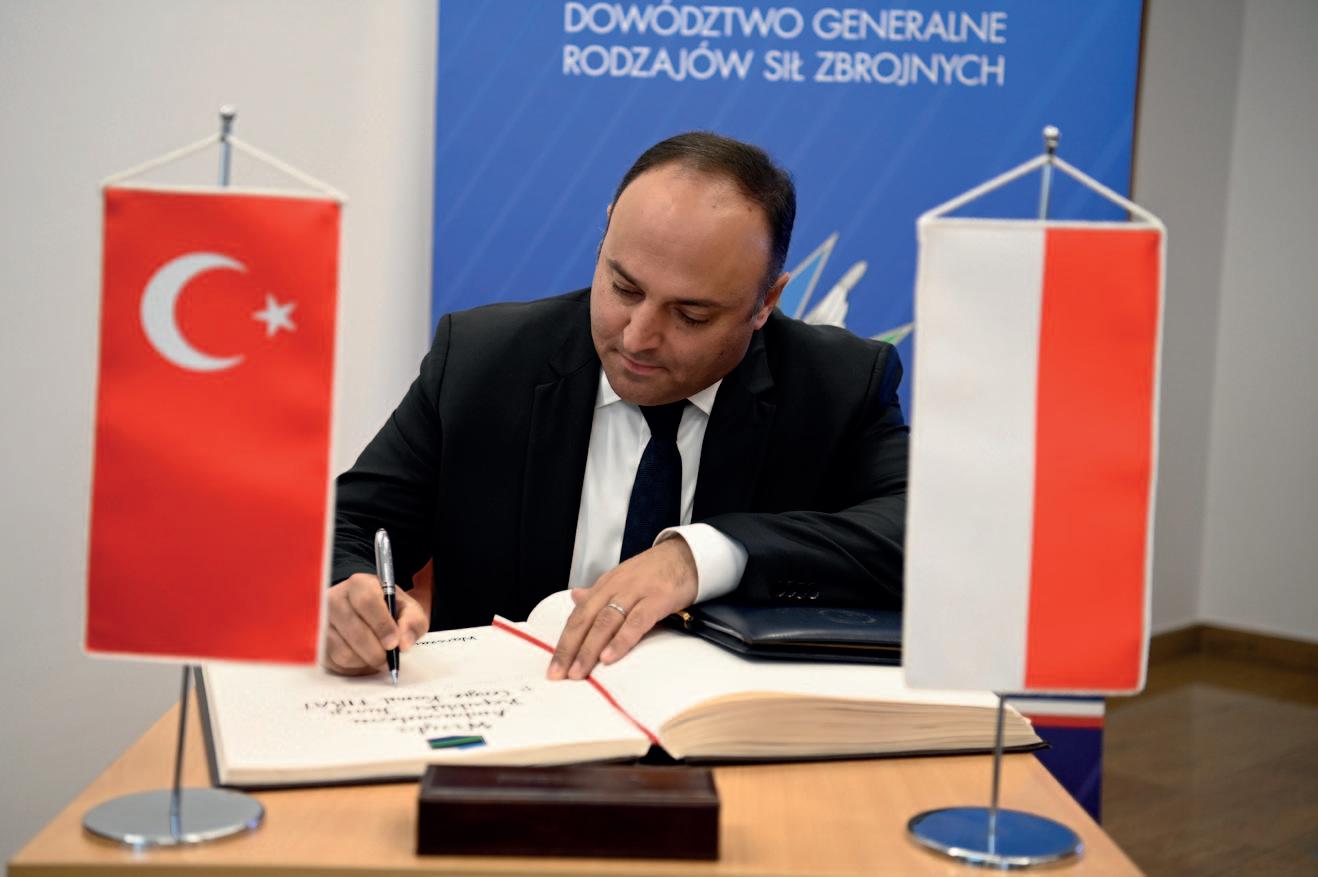
Those two issues are very important for what Türkiye has to do internally. Because apart from that, we’re working on education like every government has to do, economy, development, all this is done. But economic governance and migration issues are two top priorities.
From an external point of view, what we need to do, of course, we need to come to an understanding with the US and with the European Union that there are certain things which we have to develop together. The US has to understand that we will not change who we are because the US wants us the way they want to see us. Their policies in Syria, Iraq, or their policies in the Eastern Mediterranean do not correspond with our policies, with our interests. So we will follow our interests. And if it doesn’t bode well with the US, it will continue as is.
But at the same time, we have to work together. If you’re going to tell us, Look, you need to work with us, you put us in a situation where you call us an adversary. You have sanctions on us. It’s the toughest sanction that you have that you apply to your adversaries, ‘CAATSA’ sanctions. You don’t do that to a NATO ally, but you do. Plus, India goes and buys the same weapon. You don’t apply these to India. So where’s the double standard in this? At the same time, I’m talking about Russia, I’m talking about Iran, I’m talking about Syria, I’m talking about Iraq, all have ballistic missiles, all have rockets, all have missiles, etc. My air defenses were weak. I asked for generations. Let’s build them together. Sell them to me. Let’s co-produce them. Nada, Nada, Nada. I’ll sell it to you from this price. No, I’m building my industry. I would like to buy, but then I would like to produce. It doesn’t have to be the best weapon that you have, but one grade
underneath so that I can produce it as well with you. No, no, no, no, no. You do what you’re told…
My answer was no. So I ended up buying what I needed. It’s fair enough. You take me out of F-35, then you apply ‘CAATSA’. And now I need to upgrade my F-16s. You’re telling me, Oh, you have to be very strong. You have to be to develop, you have to spend 2 % of your GDP in NATO, and bring it up. Okay. At the same time, I’m trying to upgrade the weapons that you sold me, and you’re telling me no. It doesn’t make sense. It doesn’t make sense whatsoever. So I’m doing it myself. I had to do it myself. So there’s good and everything that is bad happening. So I’m doing it myself now. I’m learning how to do it myself. It’s taking more time and effort and more money, but I’m learning it. And now I’m selling it to people that used to sell it to me but for cheaper price, same quality.
Thank you very much for your time Mr. Ambassador.
I thank you. Thank you very much and good luck with everything!
7 July 2023
AmbA ss A dor of h ung A ry to the r epublic of p ol A nd, m rs o rsolyA z suzs A nn A kovács
dr Orsolya Zsuzsanna Kovács - hungarian lawyer, official and diplomat, from March 2, 2017, the Hungarian ambassador to Poland. A graduate of law at the Péter Pázmány Catholic University (2006), where she obtained her doctorate. She was on scholarships at the University of Tübingen and the Cardinal Stefan Wyszyński University in Warsaw. She obtained an LLM in German law at Andrássy University. From 2006 to 2010 she worked as an analyst for Polish affairs at Nézőpont Intézet. From 2010, she worked at the Ministry of Public Administration and Justice, e.g. as deputy head of the department. In 2016, she started working at the Ministry of Foreign Affairs and Trade. A year later, she became the ambassador of Hungary in Poland.
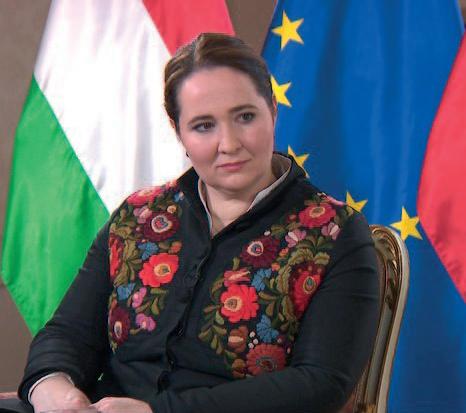
t he s Aying " p oles A nd h ung A ri A ns A re two brotherly n Ations, stA nding together in bAttle A nd in celebr Ation" h A s A deep-rooted tr A dition. d espite medi A -induced tensions, i A m convinced th At the bond between our two n Ations rem A ins wA rm A nd strong. w h At cA n we do to m A ke it even stronger?
Poland and Hungary share thousands of historical and cultural connections. In my view, these two countries are inseparable. They have always managed to overcome political hurdles. I firmly believe that we need to nurture this relationship, irrespective
of any external factors. Last year, we opened two honorary consulate offices in Lublin and Rzeszów, thereby amplifying the Hungarian presence in eastern Poland. At the end of June in Cracow, I was delighted to participate in the annual general assembly of the PolishHungarian Chamber of Commerce.
The growth of our economic relations is an unequivocal success story. Poland is Hungary's fifth most significant trading partner. Compared to the previous year, our exports grew by 19.4% in 2022, hitting 6.10 billion euros, while imports increased by 25.3% to 8.42 billion euros. The total trade in goods during this period, after a surge of 22.7%, reached 14.52 billion euros, marking a
historic high. We also support numerous local initiatives. In July, we took part in the delightful Hungarian Day at a manor house in Sułkowice, where Alex Szilasi, one of Hungary's most prominent pianists, performed. Currently, I am preparing for the traditional Hungarian Day that will be held in Szczawnica.
t he he A ds of the v isegr A d g roup governments convened on the l A st m ondAy of j une in b r Atisl AvA . t he meeting in s lovA ki A's cA pitA l focused on the situAtion in u kr A ine A nd r ussi A , A s well A s the eu 's migr Ation A nd clim Ate policy. d espite voices cl A iming the v4 is gr A duA lly losing its relevA nce, A sense of sh A red interests A nd A desire for continued cooper Ation wA s pA lpA bly felt. w h At A re h ung A ry's views on the evolution of the v4 A nd Attempts to strengthen it in the future?
Cooperation within the Visegrad Group is warranted, and there will always be issues uniting our countries. The V4, much like
Polish-Hungarian cooperation, is rooted in our common historical and cultural foundations. Ministers of culture also participated in the meeting in Bratislava, in addition to the heads of V4 governments. We are also eagerly anticipating the initiatives of the Czech presidency in the Visegrad Group.
w hen the t hree s e A s i niti Ative wA s founded, there were in Accur Ate cl A ims coming from the w est th At this wA s A pl A nned s A botAge within the e urope A n u nion. h owever, the goA ls th At the t hree s e A s set A re in A lignment with the str Ategic goA ls of the e urope A n u nion. i f the Actions tA ken within the t hree s e A s i niti Ative h A sten the implementAtion of these goA ls or elevAte their priority, it will be A dvA ntAgeous for A ll pA rties. w h At role does the t hree s e A s i niti Ative pl Ay for h ung A ry?
Hungary places significant emphasis on regional cooperation in Central Europe, where the Three Seas Initiative plays a pivotal role. We have been an active member of the Initia-
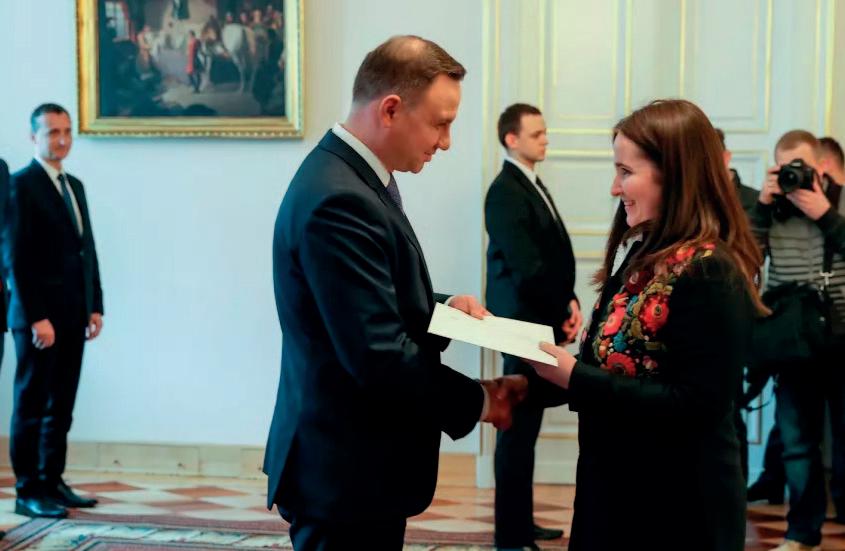
© Source: https://www.prezydent.pl/aktualnosci/listy-uwierzytelniajace/ambasadorzy-zlozyli-listy-uwierzytelniajace,6793
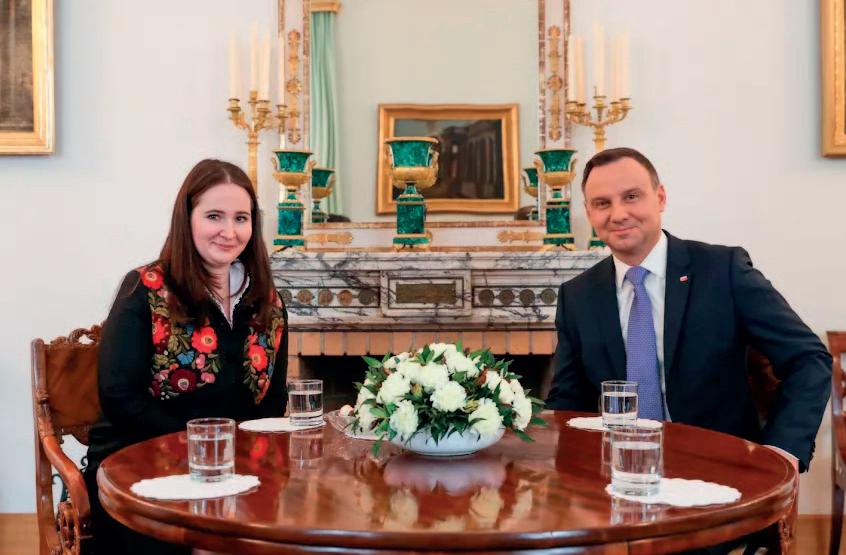
tive since its very beginning. We support the execution of joint development projects for the energy, digital, and transport base. Looking at the map of European infrastructure, a 30-year-old gap – a legacy of the Soviet era – can be seen in Central Europe. It especially concerns the underdevelopment of energy and transport in the north-south direction. These are areas that need to be addressed, and the 3SI provides an excellent framework for this. Hungary has always advocated for a project-oriented approach, as projects are the cornerstone of the 3SI and contribute significantly to achieving our common goals. Hungary also joined the Three Seas Initiative, and, in 2021, proposed 16 projects in the fields of digitization, transport, and energy.
All members of the 3SI are also part of the EU, so bolstering the Initiative means strengthening the European Union in its entirety. We must remember that the 3SI is not an adversary of the EU, but rather an initiative supporting its objectives. Hungary wishes to remain an active member of the European Union and, given our geographical location and the current geopolitical situation, we are continually assessing how we can provide fresh impetus to regional cohesion. It is in the interest of the countries in the region
to develop a closer and more comprehensive partnership in these areas to prepare for future challenges.
A nd e urope, energy security is incre A singly A ssoci Ated with energy independence.
u ndoubtedly, the wA r in u kr A ine h A s compelled m A ny e urope A n countries to diversify their energy mix A nd introduce new investment pl A ns in the energy sector. w h At A re h ung A ry's priorities concerning investments in this sector A nd further diversificAtion?
The primary aim of Hungary's energy strategy is to ensure a constant security of energy supply, affordable energy prices for its people, and decarbonization of energy production. Energy independence is a matter of economic and national security. Hungary is keen on reducing energy import dependence and diversifying energy imports, both in terms of sources and routes.
However, Hungary's geographical location limits the potential for natural gas diversifica-
tion. As a landlocked country, we rely on the infrastructure development of neighboring countries for access to LNG. Therefore, Hungary considers it a priority to support efforts that can potentially enhance the security of natural gas supplies to Hungary. One of the major diversification projects of routes and sources is the so-called "Ring of Solidarity", which aims to create the technological conditions for the delivery of Azerbaijani gas to our region, thus contributing to the security of gas supplies to Central and Eastern Europe.
Another alternative could be the exploitation of Romanian natural gas resources in the Black Sea (Neptun Deep project) and the import of these resources. The benefits for supply security, resulting from limiting dependence on import, are most apparent in the case of natural gas, as this energy carrier accounts for 32–33% of total energy consumption in Hungary. In recent years, domestic production covered about 20% of consumption, making the country reliant on imports in 80%. Our goal for 2030 is to reduce the share of gas imports to about 70% by reducing consumption and increasing domestic production.
Another strategic goal is to cover import
needs in 2030 from as diversified sources as possible. In addition, our region will enhance its LNG reception capabilities within the next 3 to 5 years. Hungary is also exploring the possibilities of playing a role in the construction of terminals and reservation of capacities. The government also strives to ensure that as much Hungarian electricity as possible is generated from carbon-neutral sources: nuclear and renewable energy, primarily solar. We view natural gas as an important transitional energy carrier in electricity production, necessary for further increasing the capacities of weather-dependent renewable energy sources. These are not mutually exclusive technologies, but mutually supportive solutions, and both can be considered as sources of clean energy. Almost half of the electricity produced in Hungary (45%) comes from carbon-neutral nuclear energy. Thanks to the investment in Paks 2, this result can be maintained in the long-term perspective. Carbon-neutral energy production is impossible without nuclear energy. In addition, the share of solar energy in energy production in Hungary (13%) is the third highest among EU member states.

coll A bor Ated to enh A nce the tr A nsport of n Atur A l g A s from r om A ni A to h ung A ry. t he pl A n is to r A mp up supplies from 280,000 to 300,000 cubic meters per hour. t he A im of socA lled " r ing of s olidA rity" is to coll A bor Ate with b ulg A ri A A nd AzerbA ijA n. w h At will this cooper Ation look like in the future, or, more specificA lly, wh At cA n we expect from it within 3si?
On April 25, 2023, in Sofia, the energy ministers of Bulgaria, Romania, and Slovakia, on behalf of the natural gas distribution system operators functioning in these countries, and on the Hungarian side, the Minister of Foreign Affairs and Trade Péter Szijjártó and the head of the Ministry of Energy of Azerbaijan signed a political declaration of intent. The goal is to ensure the delivery of Azerbaijani/ alternative natural gas to our region following certain modernizations of the transmission infrastructure between Bulgaria, Romania, Hungary, and Slovakia. According to the declaration, the system operators will investigate what improvements and what timeline for their implementation are necessary to guarantee the swiftest possible delivery of Azerbaijani gas to our region. The pipeline would have a potential capacity of about 5 to 9.5 billion cubic meters of gas per year. It is expected that, by the end of this year, up to 100 million cubic meters of natural gas from Azerbaijan may reach Hungary.
t he upcoming n Ato summit in v ilnius is set to resolve significA nt issues rel Ated to defense orders A nd investments. h ung A ry h A s been A prominent buyer in the g erm A n A rms m A rket, which h A s Acceler Ated the expA nsion of the h ung A ri A n A rmy. h ung A ry's defense spending is expected to exceed 2% of gdp in 2023. c ould you comment
on how this A ffects n Ato 's defense potenti A l A nd how it is tA ngible proof of h ung A ry's commitment?
Hungary is a dedicated and proactive member of the NATO alliance system. One of the proofs of this is the fact that in 2024, the defense budget will surpass 2 percent of GDP, significantly expediting the development process of the armed forces. So, Hungary is one of the nine NATO member states that within the Alliance not only meet NATO standards but also exceed them. The overall development of the Hungarian armed forces is progressing dynamically and stably. Thanks to the reform of the armed forces in Hungary, we will have PzH 2000 selfpropelled howitzers, H225M multi-purpose transport helicopters, Leopard 2A7+ tanks, NASAMS anti-aircraft missile systems and Gidran armored tactical vehicles. Next year, we will also have L39NG aircraft. Hungarian forces are enhancing their interoperability within the Alliance by systematizing advanced technologies also used by our NATO allies and building a modern army that meets contemporary expectations and is combatready. In addition to the development of the armed forces, Hungary also plays a role in NATO operations. It is continually active in the Alliance's military missions, such as KFOR, Baltic Air Defense (BAP). Also, together with Poland and the Czech Republic, we support the air defense of our northern neighbor, Slovakia. Hungarian forces are also active participants in NATO military exercises, which help to strengthen effective military cooperation between the members of the Alliance. All this clearly indicates that Hungary attaches the utmost importance to ensuring that NATO remains the most successful defense alliance of all time.
c h A irm A n of the s ejm foreign AffA irs c ommittee, m r rA dosł Aw Aleks A nder fogiel
Polish politician and local government member, councilor of the Mazovian regional council of the 5th and 6th term, member of the Sejm of the 9th term. From 2022, Chairman of the Sejm Foreign Affairs Committee
In 2012, he became the first vice-president, and in 2017, the president of the European Young Conservatives - an organization affiliated with the Alliance of European Conservatives and Reformists. He held this position for a full term until 2018.
In June 2019, he was appointed deputy spokesman for Law and Justice. In the parliamentary elections of the same year, he successfully ran for a parliamentary seat.
In 2021, he became vice-president of the Party of European Conservatives and Reformists. In June 2022, he was appointed spokesperson for Law and Justice. In the same year, he assumed the function of the chairman of the Sejm Foreign Affairs Committee, therefore he resigned from the position of the party's spokesman.
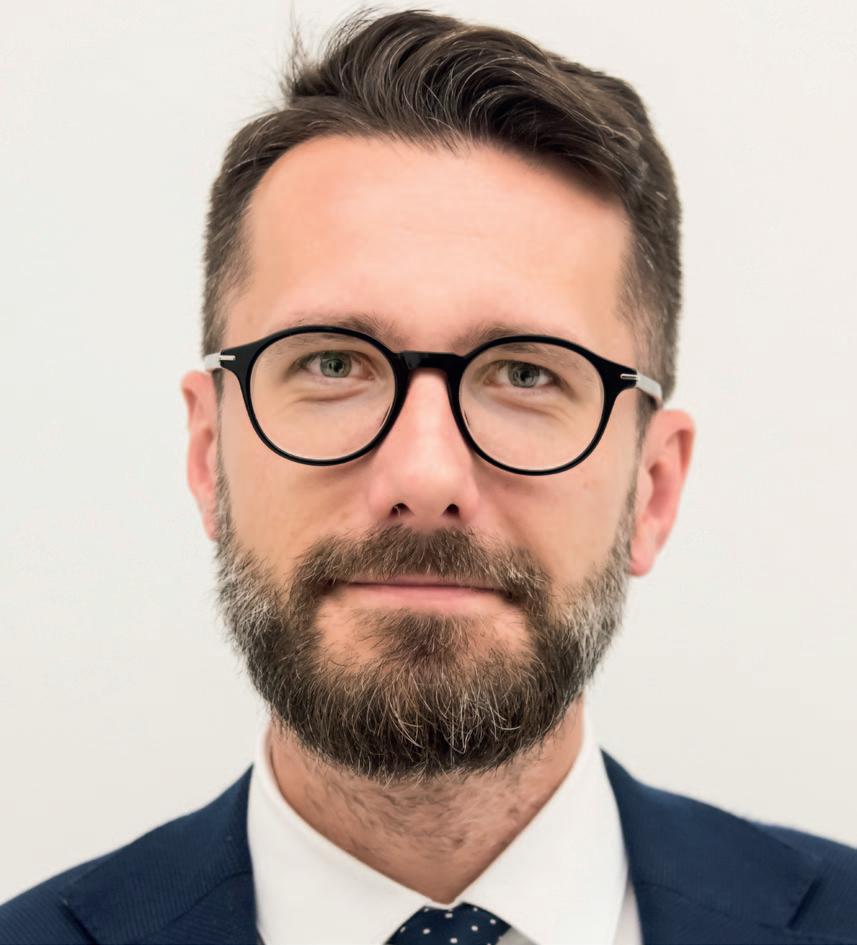
Interview with the Chairman of the Committee on Foreign Affairs (Sejm) Mr Radosław Fogiel
w h At A re the biggest priorities for p olish foreign policy in 2023?
In fact, it's not surprising to anyone that Polish foreign policy after the Russian aggression against Ukraine is mainly related to what's happening in our eastern neighbour, and its aid to Ukraine, including diplomatic efforts to build a coalition of support for Ukraine; for example, with the Leopard tanks. Just like diplomatic endeavors, for instance the Prime Minister Morawiecki’s visit to Germany right at the beginning of the war, where he convinced Chancellor Scholz that Germany should get involved. In the end, it is also actions in the international arena to establish a
Special Tribunal for Crimes of Aggression against Ukraine, and all the other actions concerning the legal aspects, that are, sanctions, creating the possibility of transferring seized Russian bank accounts or other assets to the reconstruction of Ukraine that count. This in conjunction is a very substantial part of Polish foreign policy that we are conducting. The main function of foreign policy is security, and today the key to Poland's security is a sovereign and independent Ukraine, hence these actions.
Then there is the whole area of EU policy. Of course, it remains an open question to what extent EU policy is foreign policy, but in a sense it is. All the discussions that
are going on in Brussels about the future of the European Union, the abandonment of unanimity on fundamental issues, not to mention other issues that we have been talking about for a long time about the European Commission's attempts to usurp more and more competences not provided for in the treaties, whether by the method of accomplished facts or at least through creative judiciary with the help of the Court of Justice of the European Union.
Besides, Polish diplomacy is active in many traditional areas - our key transatlantic relations from the point of view of our security, but also the Baltic countries. These are the elements of recent years related to the war in Ukraine, but not only, because these good relations began to surface earlier. Today, Poland is undoubtedly a leader in the region, and we are also trying to take advantage to raise and leverage Poland's status and position in the international arena. This is the moment when we have this opportunity.
The last thing worth mentioning is our intensified presence on the African continent. Until now, this has not been a priority area for Polish diplomacy. After President Du-
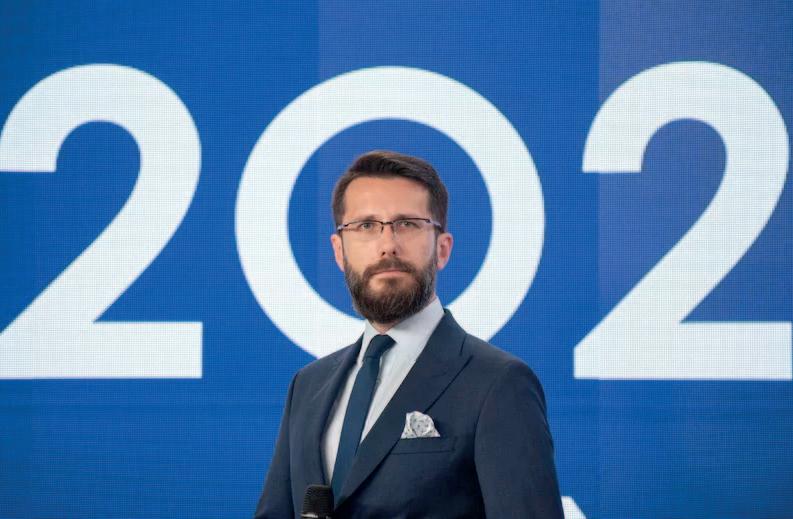
da's visit to Africa last year, we opened the Polish Embassy in the Republic of Rwanda, with which we have very good and intensive relations, not only diplomatic ones, but also trade, educational exchange, even the Polish arms industry is in the field of interest of the Rwandan army, which shows that there are very great opportunities in this direction.
t he wA r in u kr A ine h A s now l A sted more th A n 500 dAys. h ow do you A ssess p olish- u kr A ini A n rel Ations A fter such A long time? h ow much influence does history h Ave on the present dAy?
Polish-Ukrainian relations are good. This statement goes beyond such a diplomatic norm. We are talking about an extraordinary situation in which Ukraine is fighting for its independence, which is also vital for our security. At the same time, we are hosting millions of Ukrainian war refugees and are involved in helping them. So when we say that there are good relations, they are good not only at the diplomatic level but much deeper. These are very good personal relations between the presidents, and even despite the turbulence, which
will be discussed in a moment, both sides would like something lasting to emerge from this. Of course, not in the sense of some phenomena which only fantasists can dream of today, but as two states which work closely together and consult closely on many things. This is also in the context of Ukraine's European future, which, as we know, Poland strongly supports.
In this context, too, the current grain crisis is a certain indicator that we will have to approach many issues very wisely and in a balanced way from both sides because we have the right to expect Ukraine to understand our internal conditions. Of course, we are helping, we are not going to stop helping. We realise how important this is, but at the same time, we cannot afford to sink our own branch of the economy, namely agriculture because we ourselves will have much more limited possibilities for this support. We are in the same boat and it would also be vital for such issues to be resolved in the privacy of the cabinet. I hope that after recent events and mutual discussions, this will happen. This also shows a certain challenge which should not be swept under the carpet, because we must be aware that the question of Ukraine's
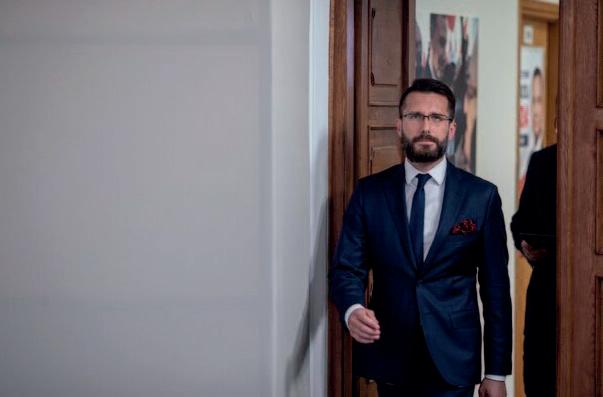
accession, for example, will require major preparations by the Union as a whole – if only in terms of the common agricultural policy. There are, of course, two sides to this coin, as the existing partnership agreement between Ukraine and the European Union largely eliminated these duties and there was no problem with Ukrainian grain before, as most of it was exported from Black Sea ports.
Today, this problem has arisen, and the problem of the European Union itself has arisen. The five countries whose markets were threatened by Ukrainian grain have made it clear that all the countries of the European Union agreed on something else, namely the creation of transport corridors that would allow the transit of grain, and unfortunately, it was the ineffective actions of the European Commission that left these few countries with the problem. Poland will certainly assist in the transit of Ukrainian grain, but we must also look after our own farmers. Of course, after the end of the war, after Ukraine's victory, these problems hopefully will not be so pressing, as normality will return to what it was before the war, namely, the possibility of exporting via the Black Sea. At the same time, this also
shows that we will be facing challenges in many areas, and certainly in the area of the common agricultural policy, which will have to be simply resolved during the accession negotiations.
The historical issues are in existence and they are still unsettled from the Polish point of view, but in order to settle them, we need an independent Ukraine with its own government which can take some decisions. We have the right to talk about this, and we did so e.g. on the occasion of the 80th anniversary of the Volhynian massacre, but this doesn`t fundamentally change our policy of supporting Ukraine in its struggle. Otherwise, there will be no one to talk to about it at all, and we want to firmly believe that Ukraine will grow up, that Ukraine's politicians will be prepared to accept the historical facts. Firstly, to apologise, and secondly, to do the most important thing in human and moral terms, which is to enable the bodies to be found and buried with dignity. Here, Ruslan Stefanchuk's speech to the Polish parliament
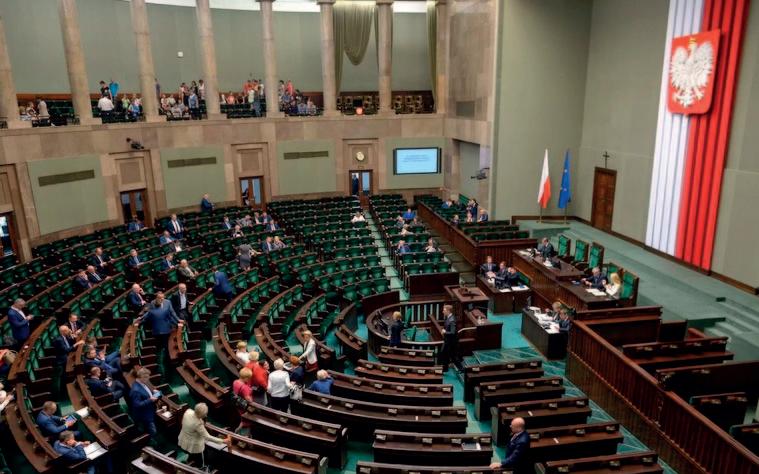
was very promising, where he declared to face the truth and accept the truth however difficult it might be.
w h At do you see A s p ol A nd's role in rebuilding u kr A ine?
The reconstruction of Ukraine is, on the one hand, an imminent challenge. On the other hand, preparations and activities must already be under way. This was mentioned during President Zelensky's recent visit to Poland. Polish entrepreneurs are signing the first preliminary declarations. There are also declarations from the Ukrainian side, which I consider to be permanent, to the effect, among other things, that at a later stage of reconstruction, significant account will be taken of how a country has supported Ukraine in terms of military aid.
We, of course, have to look at the matter realistically. Poland alone does not have the resources to realise everything we would want to. We will have to be open to various types of alliances, for example our thinktanks are discussing this in a British-Polish-
Ukrainian triangle. Other countries are also making such proposals. We must certainly remember that this is supposed to be a reconstruction which will allow Ukraine to get back on its feet and which will also, let us not deceive ourselves, be beneficial to the Polish economy. We can offer Ukraine our own experience too, which means that, at the meeting point of these two processes of European integration and rebuilding Ukraine, it is important for Ukrainians to avoid many of the mistakes which Central and Eastern European countries have fallen victim, such as uncontrolled privatisation, which was unnecessary in many places and certainly, not on the same terms as in many countries in our region during the transition period, which led to the liquidation of many branches of industry in favor of the foreign companies and their presence in that markets. These mistakes can later lead to social and economic problems and allow for the economic colonisation of the country, and we, as the whole Europe, are probably interested in a stable Ukraine in the future, and not a Ukraine torn apart by social problems.
There is also the question of funding. No country can do this on its own. There are ideas from various institutions, whether under the International Monetary Fund or others, to deal with financial matters. Of course, the Polish perspective is that, first and foremost, the Russian resources in the West, which are frozen today, should ultimately be confiscated, and should be allocated to the reconstruction of Ukraine. The aggressor needs to pay for its crimes.
p ol A nd is tA king A centr A l stAge in eu A nd world politics todAy more th A n ever. c ertA inly, this ye A r's elections will A lso be looked At with close Attention by m A ny interested pA rties. h ow do you A ssess foreign policy
The war in Ukraine has accelerated a certain process because it cannot be said that it is only a matter of war. Poland's role has been growing for years, and we have been getting stronger economically, which also translates into international relations. This was the philosophy of Law and Justice, that we have to break out not only economically from what Prime Minister Morawiecki described as a “middle development trap”, but also on the international arena.
Poland is finally taking its place or returning rather to its place in Europe as a sizable European state that has a lot to say. Suffice to say is that we ourselves are going from being a beneficiary of development aid to becoming a provider of development aid; our activities in Moldova being a good example. We are indeed finally pursuing the kind of policy that a country like Poland should pursue, i.e. a sovereign and subjective policy. We have put an end to clientelism in politics. Moreover, Poland's involvement in NATO, and the fact that we are one of the countries that led the coalition to be right to warn against Russia, gives us certain standing. The fact that we have been very skilfully involved in supporting Ukraine strengthens our position, and as we say to our allies, we are ready to take more responsibility whether within NATO or other regional constellations.
Poland is ready! We are not the only ones to see it, it is slowly becoming a kind of cliché. From our point of view, it is true that the centre of gravity of Europe is shifting to the East, or East-Central Europe. This is precisely the policy that we, as Law and Justice want to pursue.
What is this dispute about? On the one hand, it has its media aspect and on the other hand, its factual aspect. We hear all
the time in the media from our opponents that Poland's position is declining, that we are allegedly being ignored and so on. This is not true in the slightest. Suffice to say that we have become the leader of the aforementioned region that includes the Balkan countries, the Three Seas Initiative, in which we play an extremely important role. The way we are treated by the NATO allies, the Bucharest Nine - by the way, it was in Warsaw representatives gathered just after the outbreak of war, when a special NATO summit was convened, and from the National Security Office, under the leadership of Andrzej Duda, they connected remotely with the rest of the heads of state. All this shows that the Polish position is growing contrary to what the opposition accuses us of.
In addition, in the EU arena, this naive image of the union as a club of polite gentlemen and a land of eternal happiness must be rejected. This is an arena of clashing interests, of conflicting interests, and simply because we have become a player there, we have also become the target of many attacks. Our disputes with some of the
Member States or the European Commission do not show our diminishing position, but quite the contrary. Beyond the media sphere is the sphere of facts. The realm of facts is best exemplified by the relationship of Poland under our predecessors, who would like to regain power concerning our two biggest neighbours, Germany and Russia. We were the transmission belt of German policy towards Russia, which was that Germany wants to become a hub for distributing cheap Russian energy to Europe. And Poland's task was not to interfere, or at most to pass on to the Baltic states, what Germany wanted. There was not an ounce of subjectivity in this policy, there was no Polish raison d'etat. It involved attacking those who warned against Russia, such as the late President Lech Kaczyński. The opponents of our predecessors were attacked as Russophobes. This, plus the symbolic invitation of Sergey Lavrov to the Council of Ambassadors by Radosław Sikorski, really shows the foreign policy of the Civic Platform. Additionally, it should be added that it was largely subordinated to the personal interests of Donald Tusk, who simply wanted to obtain an important position in
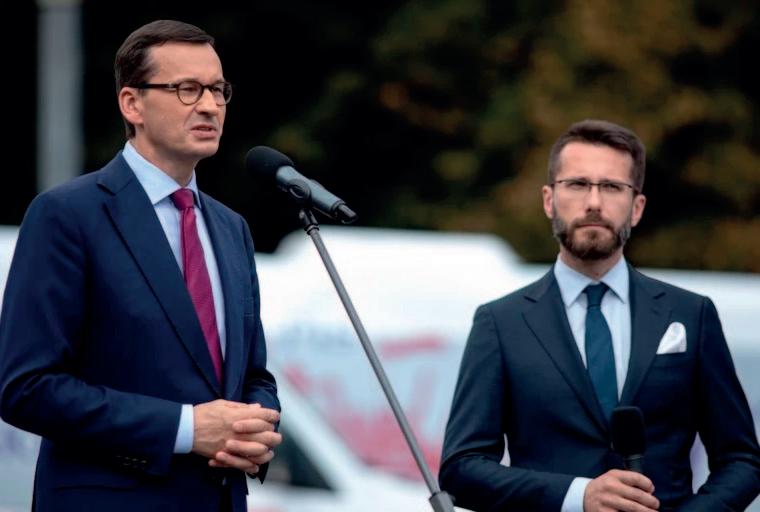
the European Union, and could only do so with the support of Angela Merkel. Consequently, this subservience to Germany on several key issues, the culminating issues of which were migration, migration quotas, and relocation of illegal migrants. This is the fundamental difference between the policy of Law and Justice and the main opposition party, and I do not doubt that such a policy would return if there were a change of government. One can still add this ever-present Ukrainian aspect. I am absolutely convinced, and I am concluding what has been done so far, that Poland would not have been such a leader in aid to Ukraine if a different team had been in power. We would not have been building a coalition of Leopards in defiance of the Germans but would have been waiting for orders from Berlin, or at least for the green light from Berlin, which, as we all know, was not particularly eager to help.
d isinform Ation is A useful tool employed by foreign Actors to exert extern A l or domestic pressure - why is th At p ol A nd, A lthough witnessing vA rious wAves of disinform Ation, h A s well resisted these extern A l pressures?
I would like to see it resisted even better. It is not, in fact, such a problem as in other European countries, it does not have such an impact on public opinion, but we do have a lot of false information in the public space. Starting with the hybrid attack on the Polish-Belarusian border, and unfortunately, part of the media is participating in this by reproducing this untrue information. We have a very large production of fake news or disinformation which tries to exploit historical events. Unfortunately, we also have politicians, or people strongly linked to politicians, who reproduce Kremlin disinformation for the purposes of internal political struggle in Poland. What Vladimir Putin said recently in a public speech accusing Poland of alleged
partitioning intentions towards Ukraine was unfortunately formulated earlier in the public space by Radosław Sikorski and undoubtedly close to the Civic Platform, Roman Giertych. These are the real challenges facing Poland. Not to be purely pessimistic, I have the impression that the resistance of the population passes this test much better than at least the names I have cited.
The overwhelming majority of Poles are immune to Russian disinformation. I think this is such an immunity resulting from history. We know very well that you cannot believe anything that comes from Russia unless you are a naïve politician and it is a policy of reset. Besides, we quite naturally recognise these Russian provocations, and Russian narrative lines.
Where is this disinformation most prevalent? In the electronic media, and above all in social media, here public institutions and parts of the media play a big role.
NASK - National Research Institute (NASK - Państwowy Instytut Badawczy) runs a huge project on identifying and warning against Russian disinformation. There are also various other, minor projects, this too is not insignificant. In a society that is mostly aware of who the real aggressor is, in contrast to some Western countries, where these false arguments about alleged provocations by NATO, about the need of recognising some right of Russia to decide about the region, there this disinformation falls on more fertile ground. In Poland, the situation is very clear. We know who the victim is, we know who the aggressor is. We know that supporting Ukraine is also in our best interests. This also makes the resistance to Russian disinformation grow.
p ol A nd surged to the top of n Ato 's spending ch A rts this ye A r, with the A lli A nce's l Atest forecA st showing it pouring 3.9% of gross domestic product into militA ry goA ls.
w h At cA n you tell us A bout p ol A nd’s future pl A ns to scA le up militA ry A ssets A nd defense procurement contr Acts?
Today, we have indeed undertaken a huge effort to expand and modernise the Polish army. This process began long before the Russian aggression; after all, some of the contracts that were signed, for example for the F-35, were signed long before the war, as was the work on the bill for the ‘Defence of our Homeland Act’. The war itself was the catalyst here, which accelerated many activities, if only in terms of post-Soviet equipment, it made it possible to give up this post-Soviet equipment much faster, also by handing it over to Ukraine and replacing it with modern, Western or Polish designs.
When it comes to defence, strengthening Polish security, there are, in my opinion, two most important aspects. Firstly, it is NATO itself. Poland has called for a drastic change in the rules of security spending by member states, and it is a big success for Poland at the Vilnius Summit, that this 2% has become a starting point, not a point of arrival. Poland will also lead by example. In the Homeland Defence Act itself, we have written in 3% of GDP as a necessary minimum, so even our internal regulations oblige us to do that, and today's needs make us spend almost 4%, and that probably won't change for some time, because it is an absolute necessity. We have realised for a long time that Russia is a threat to order in Europe, and the war in Ukraine has probably made that clear to everyone. Spending is one thing, but the second thing is spending on what. We today have to build some elements from scratch, such as the entire air defence, which was practically non-existent before 2015. Today we have 'Wisła', 'Mała Narew', 'Patriots', and we are talking to the Swedes about buying these so-called small 'AWACS' to secure the Polish sky. Here, there is also the issue of armoured troops, hence the contracts for "Abrams"
with the United States and for the Korean 'K2'. We produce our own cannon Howitzers - 'Krabs', which are performing well in Ukraine. We need to fill the warehouses quickly, and we are therefore buying fairly compatible Korean 'K9s'.
Apart from that, there is the whole domestic industry, starting from 'Grot' carbines, which the entire Polish Army will eventually be equipped with, through the 'Piorun' antiaircraft sets, which are the most modern in the world today and are still being expanded and modernised. Tests have just been completed on the 'Borsuk', the successor to the infantry fighting vehicle used for decades in Poland of a still Soviet design. In addition, we are polonizing 'Haimars', where the missiles themselves will be American, but the chassis and trucks will be of Polish manufacture. Ultimately, we also want the 'K2' tanks to be polonized, and there are plans for production or co-production in Poland, so we are modernising the army, but we are also increasing the capabilities of Polish industry and we are very strongly focused on increasing the size of our army. Conscription is suspended in Poland, and no one has any intention of changing this, but at the same time we need a much more numerous army. We are doing this by establishing a separate type of armed forces, the territorial defence forces, and developing them, in addition to which we are introducing many incentives to promote the army among the public. We have also introduced voluntary compulsory military service, which is well remunerated, and will hopefully result in us having many more trained citizens, some of whom may decide to pursue a career in the military. The international situation indicates that nothing will change in the coming years. To quote the Western media, Poland will have the strongest land army in Europe in a few years, and that is our goal.
lili A n A Śmiech graduated in International Business from the Cracow University of Economics, in Energy Studies at the Warsaw School of Economics, in Energy Within Environmental Constraints at HarvardX and in Energy Economics and Policy at the Massachusetts Institute of Technology. President of the think tank Warsaw Institute. Scholarship holder of the Japanese government programme MIRAI Politics&Security. Co-author of the report “Energy Poverty – Situation of Households in 2021”.
She has gained professional experience in the European Parliament and in major multinational corporations. Her main interests are energy transition, sustainable development and geopolitics. Privately, she is a sailor, beekeeper, judge and artistic gymnastics coach.
p. 23, 29
kAtjA - e lisA beth h errm A nn works as a research fellow at the Warsaw Institute. She graduated with an MA in Transatlantic Affairs from the College of Europe (Warsaw, Poland) and the Fletcher School of Law and Diplomacy at Tufts University, cross-registering as a student at the Harvard Kennedy School of Government (Boston, MA). Additionally, Katja-Elisabeth holds a BA in International Relations and International Organizations, which she combined with a degree in International and European Law (LLB) from the University of Groningen.
p. 7
kAcper k itA analyst and columnist, member of the editorial board of the Nowy Ład portal, leading the video section. Particularly interested in international politics and culture. Author of biographies of Éric Zemmour, Giorgia Meloni and biographical essays on Charles de Gaulle, Marine Le Pen and Benjamin Netanyahu, among others.
Her research is mainly devoted to transatlantic security and defense topics, particularly emerging and disruptive technologies. She was recently awarded the Squire Patton Boggs Foundation public policy fellowship in 2022 to conduct research on U.S. domestic politics and the Three Seas Initiative. She is also interested in cybersecurity and crisis management. She recently presented her research at the Fletcher School on semiconductor technologies’ political and industrial landscape in the U.S. and the EU. She will continue her research, focusing on the challenges and opportunities for military procurement for NATO allies.
p. 7